Drive sales on autopilot with ecommerce-focused features
See FeaturesRead summarized version with
In this Constant Contact review, you’ll see that it’s been a popular tool in the email marketing world for years — but is it still the best choice for your business in 2025? This comprehensive review dives deep into Constant Contact’s features, pricing, pros, and cons to help you make an informed decision.
Whether you’re a small business owner, event planner, or ecommerce entrepreneur, this Constant Contact review will guide you through the platform’s offerings and help you determine if it’s the right tool for your marketing strategy.
While Constant Contact has evolved over the years, so have its competitors. This review will help you understand how Constant Contact has kept pace with modern marketing needs or if it’s time to consider more advanced alternatives.
Are you ready to elevate your email marketing game? Let’s get into some detailed Constant Contact reviews and discover if it’s the solution for your online business.
Quick sign up | No credit card required
Constant Contact may not be right for you if:
You need advanced automation features or in-depth segmentation capabilities. In this case, other solutions like Omnisend could be a better option, offering more sophisticated marketing tools at a competitive price.
Constant Contact may be right for you if:
You’re a small business or event organizer looking for a straightforward email marketing tool with basic features and niche offerings like event management and survey capabilities.
Learn more about Omnisend as a Constant Contact alternative.
What is Constant Contact?
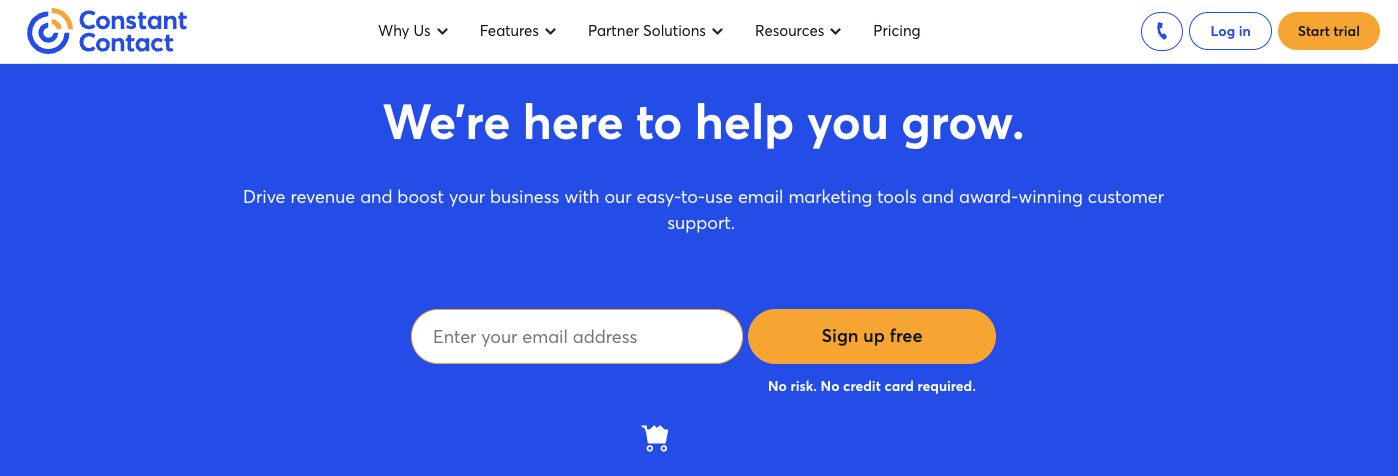
Constant Contact is a well-established email marketing platform that offers a range of tools designed to help businesses create, manage, and track their email campaigns.
The platform aims to provide an all-in-one solution for small to medium-sized businesses looking to engage with their customers through various digital channels.
Constant Contact is popular among various types of businesses:
- Small businesses: It’s ideal for those needing an all-in-one marketing tool without complex features. The platform’s simplicity appeals to business owners who want to handle their marketing without a steep learning curve.
- Event planners: The platform excels in promoting and managing events. It offers tools specifically designed for event marketing and ticket sales.
- Nonprofits: Organizations may find it useful for running fundraising campaigns and newsletters. Constant Contact’s ease of use and donor management features make it a popular choice in the nonprofit sector.
- Ecommerce: While not as specialized as some competitors, it offers basic features for automating abandoned cart emails and promotions. However, more advanced ecommerce businesses might find the features limiting.
Key features of Constant Contact include:
- Email marketing: Send newsletters, promotions, and updates to your subscriber list. The platform offers a variety of customizable templates to suit different industries and purposes.
- Automation tools: Create automated workflows and trigger emails based on user actions. While the automation features are present, they are more basic compared to some competitors.
- SMS marketing: Reach customers through text messages (available as an add-on). The SMS marketing feature allows for multi-channel communication, although it’s not as integrated as in some other platforms.
- Social media marketing: Manage and schedule posts across various social platforms. This feature helps you maintain a consistent online presence.
- Event management: Promote events, manage registrations, and sell tickets directly through the platform. This is one of Constant Contact’s standout features, particularly useful for businesses that frequently host events.
- Surveys and polls: Gather customer feedback to improve your products or services. This feature can be invaluable for businesses looking to engage with their audience and collect data.
While Constant Contact offers a solid set of features, some advanced capabilities may be limited compared to more specialized platforms, especially in areas like automation and email segmentation. However, its ease of use and broad set of features make it a good choice if you’re looking for simplicity and an all-in-one approach to digital marketing.
Constant Contact pricing review
Constant Contact’s pricing structure is based on the number of contacts in your email list, with three main plans available: Lite, Standard, and Premium. Each plan offers different features and capabilities, with prices increasing as your subscriber list grows.
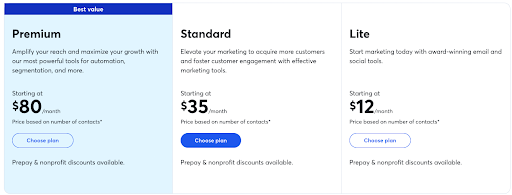
The Lite plan starts at $12/month for up to 500 contacts, offering basic email marketing features. The Standard plan begins at $35/month for the same number of contacts but includes more advanced features like automation and ecommerce capabilities.
The Premium plan starts at $80/month and provides the full suite of Constant Contact’s features, including advanced reporting and multi-user accounts.
Here’s a breakdown of how prices increase with the size of your email list:
| Contacts | Lite Plan | Standard Plan | Premium Plan |
| 0-500 | $12/month | $35/month | $80/month |
| 5,000 | $80/month | $110/month | $200/month |
| 10,000 | $120/month | $160/month | $275/month |
| 20,000 | $230/month | $260/month | $375/month |
| 50,000 | $430/month | $460/month | $575/month |
It’s worth noting that while Constant Contact’s pricing starts relatively low, it can become quite expensive as your list grows. For comparison, some competitors like Omnisend offer more features at similar price points, especially for ecommerce businesses.
Constant Contact’s pricing structure is most appealing to small businesses and organizations with limited contact lists that prioritize ease of use over advanced features. The platform offers a 30-day free trial for new users, allowing you to test the features before committing. If you do commit but end up not satisfied, there’s a 30-day money-back guarantee.
However, there’s no permanent free plan, which might be a drawback for businesses just starting out or those with very small lists. When considering the pricing, it’s crucial to evaluate not just the cost but also the value you’re getting in terms of features, ease of use, and how well it aligns with your specific marketing needs.
While Constant Contact may seem cost-effective for smaller lists, businesses planning significant growth should consider how the pricing scales and whether the features at higher tiers justify the cost compared to other options in the market, like Omnisend.
Constant Contact pros and cons
Let’s take a closer look at the strengths and weaknesses of Constant Contact to help you determine if it’s the right fit for your marketing needs.
Pros of Constant Contact
Constant Contact has its strengths, including the ability to create and send surveys, plan SMS marketing strategies, and integrate with other tools in your marketing stack. Here’s a breakdown of some of the key advantages of using Constant Contact for your business:
Niche features
Constant Contact offers unique tools such as surveys and ticket sales. These features make it appealing for event organizers and businesses needing specialized marketing options.
The platform’s niche features can add to your marketing toolkit, especially if you frequently organize events or need to gather customer reviews.
With Constant Contact, you can:
- Create and distribute email surveys to gather customer feedback, helping you improve your products or services
- Manage event registrations and sell tickets directly through the platform, streamlining your event marketing process
- Generate detailed reports on survey results and event attendance, providing valuable insights for future planning
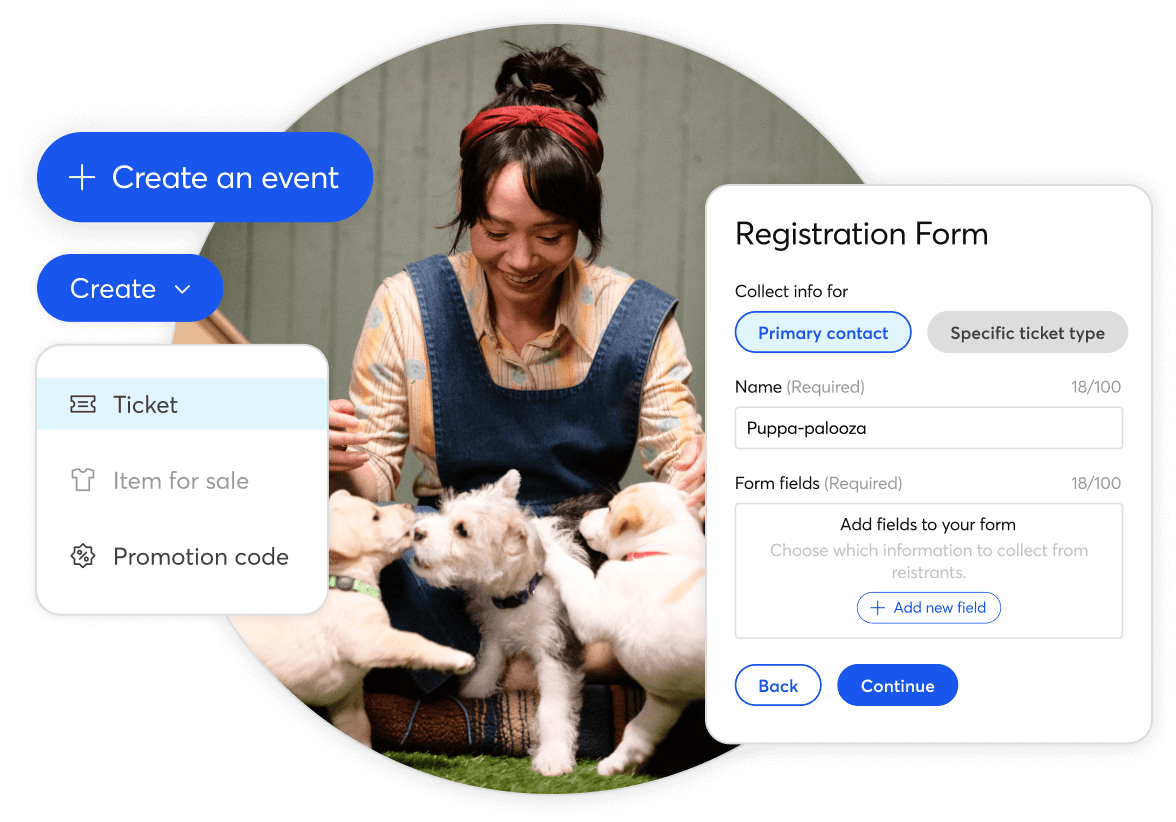
High deliverability rates
One of Constant Contact’s central points is its ability to deliver emails effectively. High deliverability means your emails are more likely to reach your subscribers’ inboxes and not their spam folders.
This advantage has the potential to bring you the following:
- Better engagement rates, as more of your subscribers actually see your emails
- Higher open and click-through rates, improving the overall effectiveness of your campaigns
- Increased email marketing ROI, as your messages consistently reach their intended audience
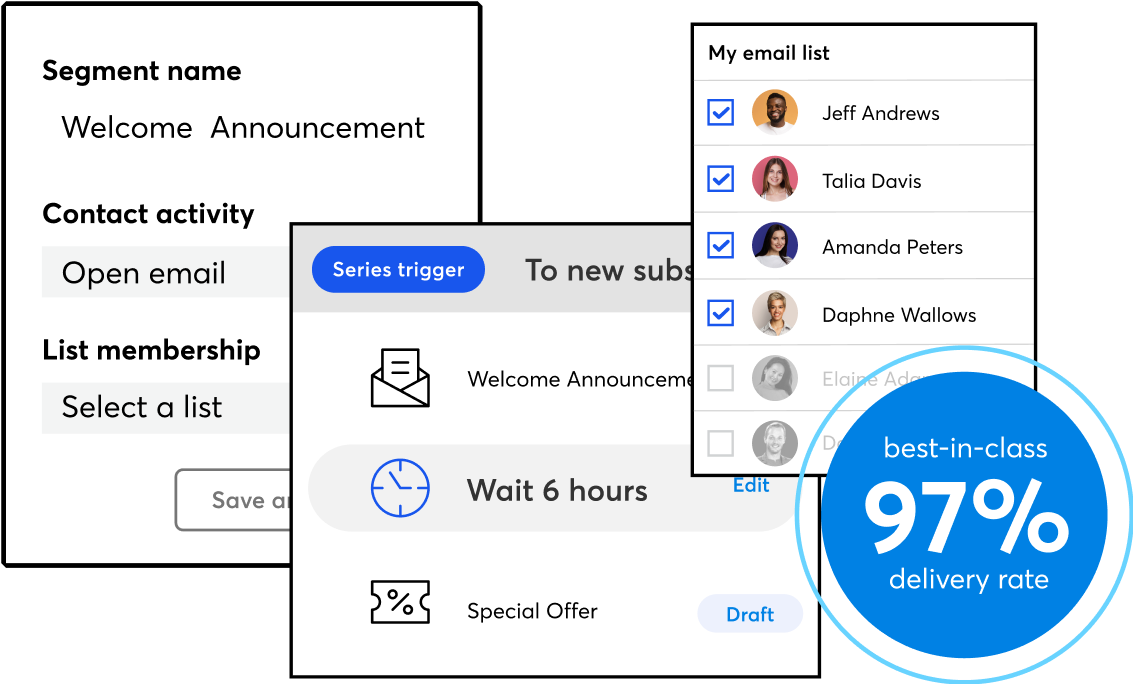
Robust integration capabilities
Constant Contact integrates with over 6,000 apps and tools. This allows you to connect the platform with your existing systems, enhancing workflow efficiency.
Some of these app integrations include:
- CRM systems: Sync your email marketing with customer relationship management tools like Salesforce or HubSpot
- Ecommerce platforms: Connect with Shopify and WooCommerce to manage product promotions and abandoned cart emails
- Social media: Post directly to Facebook, Instagram, and other platforms, ensuring consistent messaging across channels

User-friendly interface
Constant Contact prides itself on its intuitive, easy-to-use interface, making it accessible even for those new to email marketing. The platform’s user-friendly design offers several benefits:
- A short learning curve, so you can start creating campaigns quickly
- Drag-and-drop email editor for effortless email design with no need for coding knowledge
- Clear navigation and well-organized menus that make it easy to find the features you need
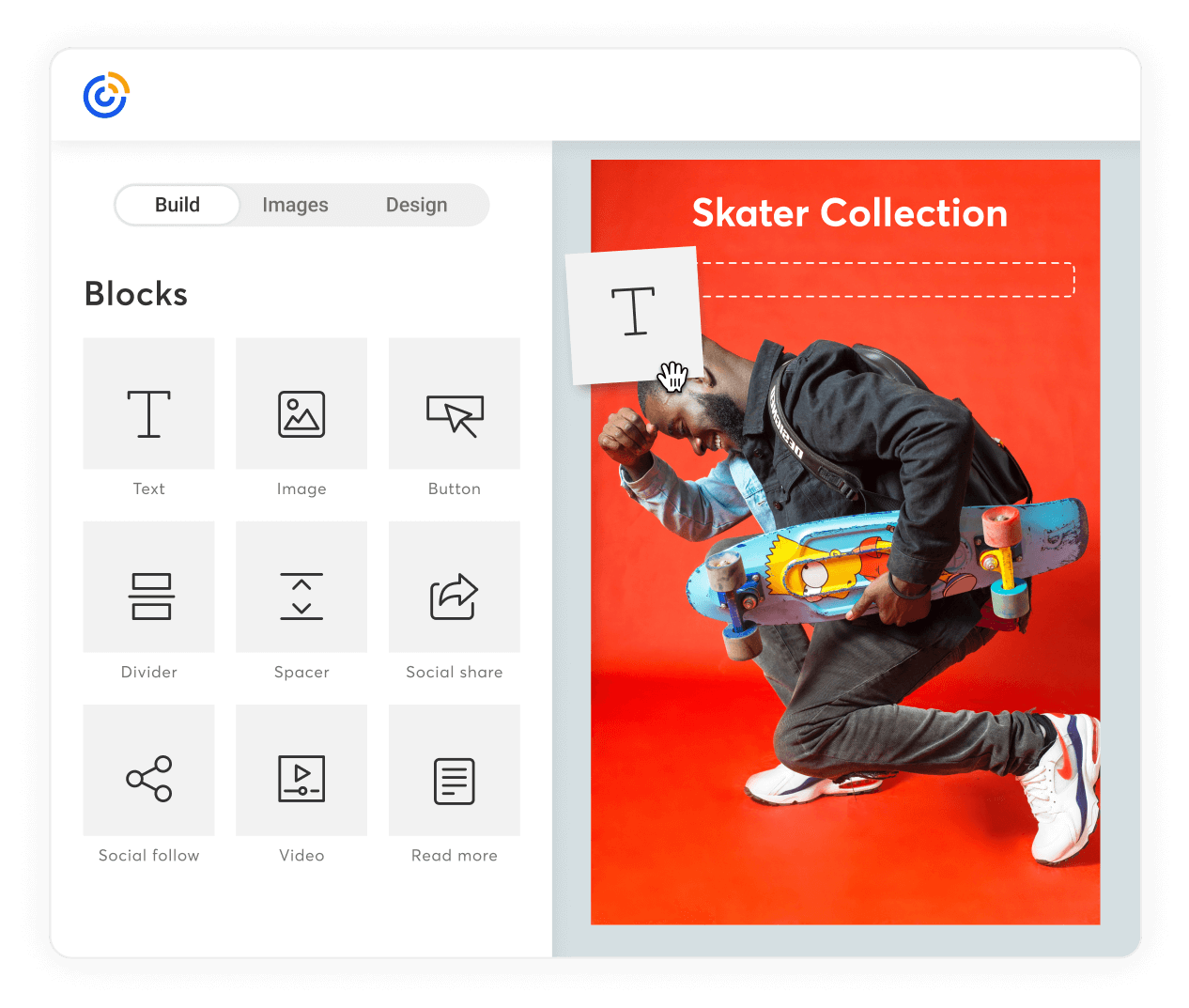
Cons of Constant Contact
While Constant Contact offers a mix of unique features and flexible integrations, it also has notable drawbacks in pricing, automation, and account management.
Poor price-performance ratio
Constant Contact’s pricing can be steep, especially given the features it offers. Even though it starts at $12/month for 500 subscribers, the cost can rise quickly as your list grows.
Some key points to keep in mind:
- Basic features: Even at higher price tiers, some features remain basic compared to competitors
- Additional costs: Features like SMS marketing and advanced email previews require extra fees
- Scalability issues: As your list grows, the cost may outpace the value you receive, especially compared to more feature-rich alternatives
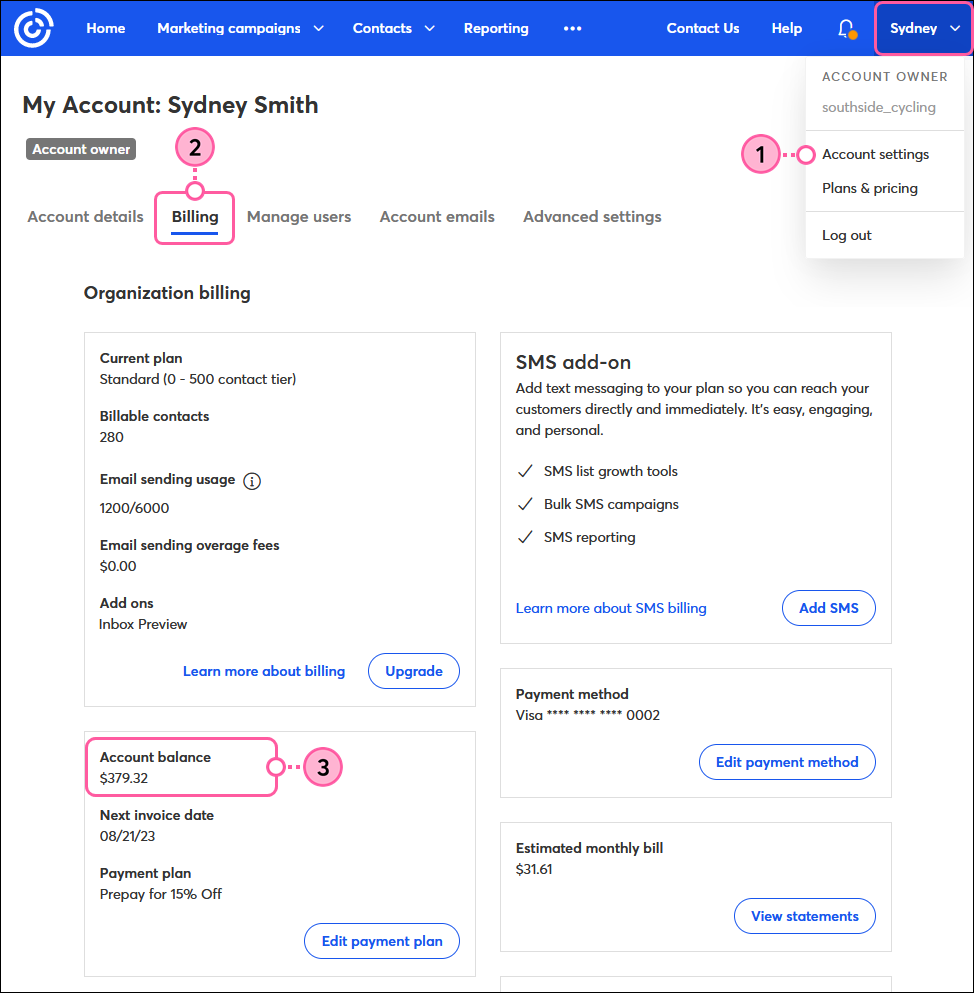
Limited automation and unavailable segmentation on lower tiers
Automation and customer segmentation are crucial for effective email marketing, but Constant Contact falls short here, especially in its lower-tier plans. These limitations include:
- Limited automations: Simple triggers such as welcome emails and date-based campaigns are available, but more complex workflows are lacking
- No advanced workflows: You can’t combine conditions and actions as flexibly as with competitors, like Omnisend, limiting the sophistication of automated campaigns
- Segmentation restrictions: Lower-tier plans don’t include advanced segmentation options, limiting your ability to target specific audience groups effectively
- Lack of behavioral targeting: The platform struggles to offer deep insights based on subscriber behavior, a feature that’s becoming increasingly important in modern email marketing
Learn more about effective email marketing automation:
Email marketing automation: Explanation, strategies, & tools
What is email automation: steps, examples, tools + tutorial
Welcome series: How to create & examples [2024]
Challenges in canceling the account
Canceling your Constant Contact account can be a hassle. Unlike many modern platforms, you cannot simply cancel online through your account settings. Instead, you must:
- Call customer service: Cancellations require a phone call during business hours, which can be inconvenient for busy business owners
- Navigate complex procedures: The cancellation process involves several steps and can be time-consuming, potentially leading to frustration
- Be aware of long-term commitments: Annual plans offer discounts but lock you into a year-long commitment, which can be problematic if you decide the service isn’t right for you
This outdated cancellation process can be a significant drawback, especially for users who value flexibility and easy account management.
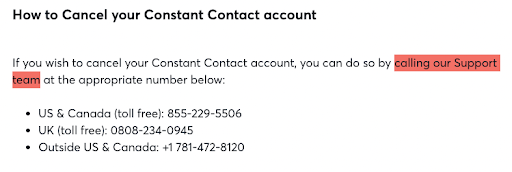
Limited customization options
While Constant Contact offers a user-friendly interface, it sometimes comes at the cost of customization and flexibility. Drawbacks in this area include:
- Restricted template customization: The email templates, while numerous, can be limiting for brands wanting a unique look
- Basic design tools: The drag-and-drop editor, while easy to use, lacks advanced design features found in some competing platforms
- Limited A/B testing: Options for split testing are basic, restricting your ability to optimize campaigns effectively
- Inflexible forms: Signup forms and landing pages have limited customization options, potentially impacting lead generation efforts
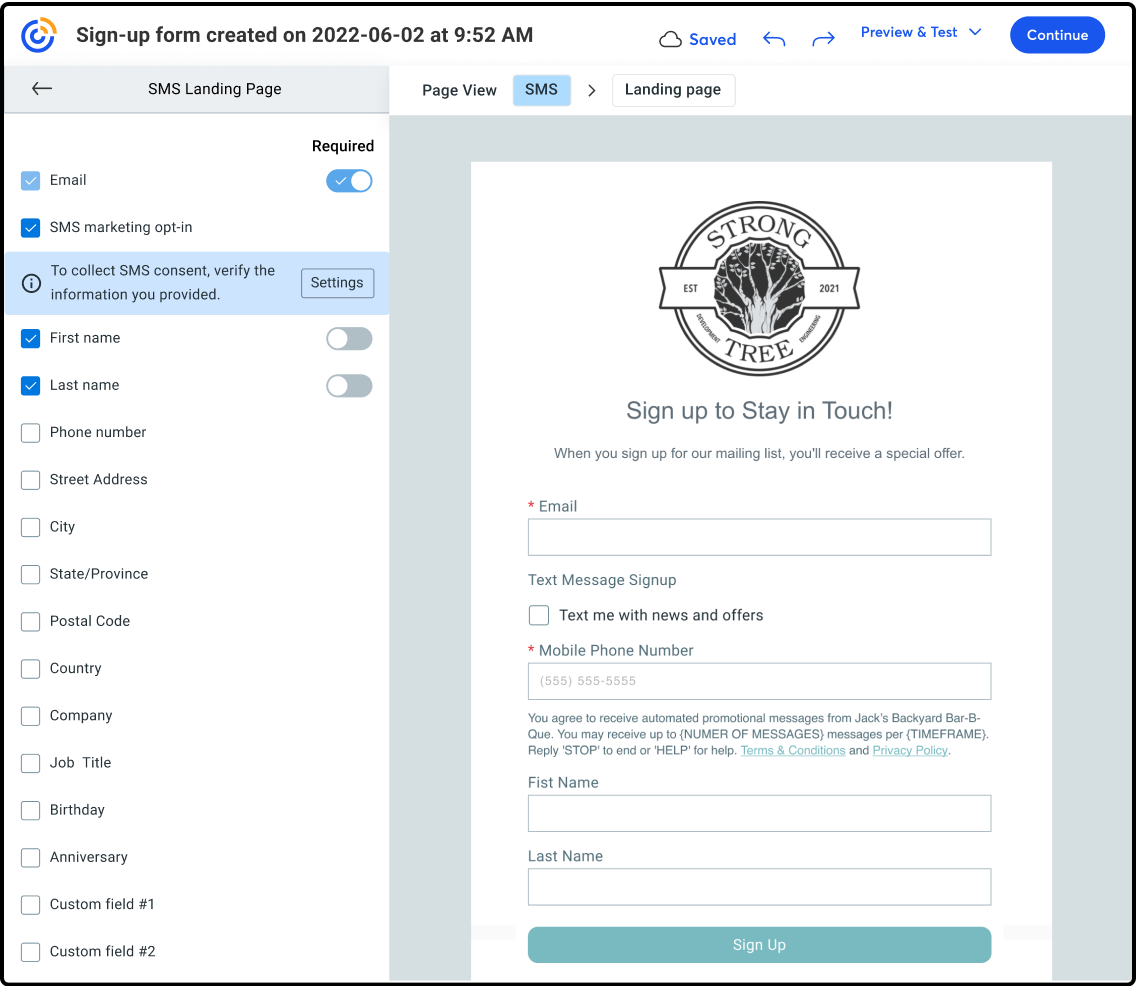
Constant Contact alternatives
While Constant Contact offers a good range of features, it may not be the perfect fit for every business. Here are some alternatives worth considering:
Omnisend
Omnisend offers more advanced automation features, better segmentation capabilities, and a more competitive pricing structure compared to Constant Contact. It excels in providing ecommerce-specific tools like product recommendation emails and advanced cart abandonment sequences.
Mailchimp
Mailchimp is widely used and well-known, and offers a user-friendly interface similar to Constant Contact but with more advanced automation features. It also provides a free plan for up to 2,000 contacts, making it a favorable option for businesses just starting out.
Brevo
This platform stands out for its affordable pricing and comprehensive feature set. It offers advanced segmentation, a powerful automation builder, and includes SMS marketing in its plans, making it a versatile choice for businesses of all sizes.
GetResponse
GetResponse is another alternative that offers a wide range of features, including webinars, landing pages, and advanced automation workflows. Its pricing is competitive, and it provides a well-balanced mix of ease of use and advanced capabilities. GetResponse is particularly strong in its lead generation features and integration with webinar marketing.
ActiveCampaign
For businesses looking for more advanced automation and CRM features, ActiveCampaign is worth considering. It offers sophisticated automation workflows, deep data insights, and flexible integration capabilities. While it may have a steeper learning curve than Constant Contact, it provides more powerful tools for segmentation and personalization.
When choosing an alternative to Constant Contact, consider factors such as your business size, growth plans, specific feature needs (for example, ecommerce tools and automation complexity), budget, and desired level of customer support. Each of these alternatives has its own strengths, and the best choice will depend on your unique business requirements and marketing goals.
Explore Omnisend as a Constant Contact alternative:
Omnisend vs Constant Contact: Comprehensive comparison [2024]
Summary
In this comprehensive Constant Contact review, we’ve explored the platform’s features, pricing, pros, and cons to help you make an informed decision about your email marketing tools in 2025. So, is Constant Contact worth it?
It offers a user-friendly interface, high deliverability rates, and niche features like event management and surveys. It’s a solid choice for small businesses, nonprofits, and event organizers who prioritize ease of use and basic email marketing functionality.
However, the platform falls short in areas like advanced automation, segmentation capabilities (especially in lower-tier plans), and customization options. Its pricing structure can also become expensive as your subscriber list grows, potentially offering less value compared to some competitors.
So, if you’re looking for more sophisticated ecommerce features, advanced automation, or better scalability, alternatives like Omnisend may be more suitable. Always consider your specific needs, budget, and growth plans when choosing an email marketing platform.
TABLE OF CONTENTS
TABLE OF CONTENTS


No fluff, no spam, no corporate filler. Just a friendly letter, twice a month.

 OFFER
OFFER







